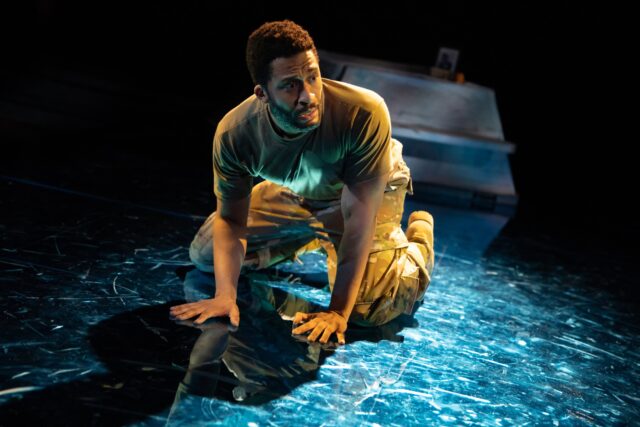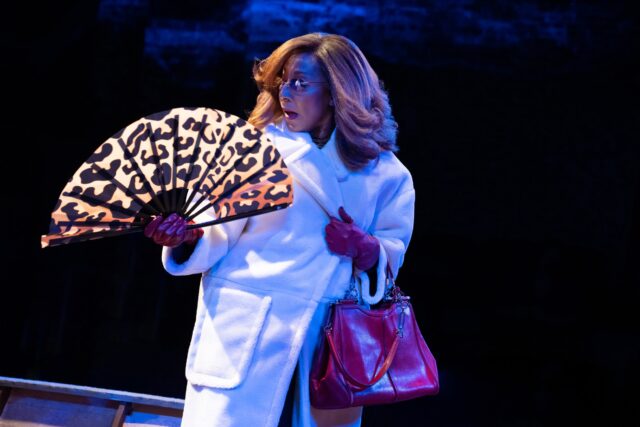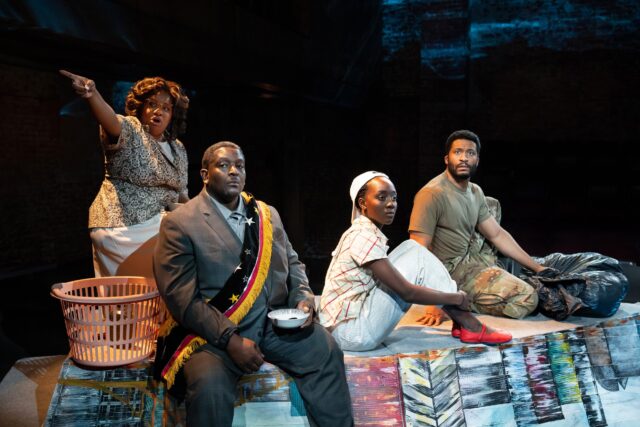
Ulysses Lincoln (Sean Boyce Johnson) searches for a way back to Harlem in black odyssey (photo by Julieta Cervantes)
black odyssey
Classic Stage Company, Lynn F. Angelson Theater
136 East 13th St. between Third & Fourth Aves.
Through March 26, $77
classicstage.org
Marcus Gardley’s black odyssey is one of those genius ideas you hope will pay off. It turns out to be a mixed bag, as poet, playwright, assistant professor, actor, and screenwriter Gardley and director Stevie Walker-Webb have so many takes on the story that it sometimes feels like they’ve thrown everything but the kitchen sink at the audience, and the message feels clogged in the end.
A reimagining of Homer’s epic poem The Odyssey through the lens of African American history, the play premiered in Denver in 2014 and was revised three years later for the California Shakespeare Theater. Revised again for its New York premiere, it is now completing a run at Classic Stage, taking place on David Goldstein’s minimalist set, a glossy black rectangular platform, the only props two halves of a wooden boat.
The 150-minute show (with intermission) opens with a chorus, representing chess pieces, delivering a fourth-wall-breaking prologue.
“Let us begin at the beginning so we may end at the end / Shake off the cares of this day, my friend. Close your eyes / Breathe in the perfume of mother nature: her still waters run deep / As do her blue skies. There is no griot greater. / And like her, we have come to sow and season and play/ But don’t get too excited, this part here is just . . . foreplay,” they announce with a Shakespearean touch.
“You are the true star in our galaxy. / Only you can guide our ship through this tale we call ‘black odyssey.’ / It is by the light of your smile, the sparkle in your eyes / That we compass our way to the end. So, hold on tight, my friend. / Yet get loose: let the music move you some. Sing if you feel like singing / And if you can’t hold a tune then baby hold a hum. Sway. / Dance if your feet can’t stand you. Clap or stomp even if it scares you. / Shout out when the spirit gets in your bones. But please, for the love of the gods turn off your beeping cellphones.”

Harriett D. Foy brings the house down as Aunt Tee in black odyssey at Classic Stage (photo by Julieta Cervantes)
Deus (James T. Alfred), the god of the sky, and Paw Sidin (Jimonn Cole), the god of the sea, are playing chess with mortals’ bodies. Paw Sidin is determined to exact revenge on Ulysses Lincoln (Sean Boyce Johnson), who killed Paw Sidin’s son, Poly’famous (Marcus Gladney Jr.), in battle. Aunt Tee (Harriett D. Foy), the goddess of war who is Deus’s daughter and Ulysses’s aunt, is ready to do whatever is necessary to protect her nephew.
In Homer’s Odyssey, Odysseus endures many trials as he attempts to return to his wife, Penelope, and son, Telemachus, in Ithaca after the Trojan War; here, Ulysses is struggling to get home to his wife, Nella P. (D. Woods), and son, Malachai (Gladney Jr.), in Harlem after fighting overseas. “I went to war to make a better life for myself,” he explains. “I wasn’t supposed to serve. I signed up during peacetime but then 9/11 happened, the World Trade Center came down, and before I knew it . . . I was in Afghanistan.”
When Ulysses joined the navy, Nella P. was eight months pregnant. Sixteen years later, Nella refuses to believe that her still-missing husband is dead while she raises Malachai and is beguiled by a suitor (Cole). Over the years, Paw Sidin has put on disguises to trick Nella, punishing her and Malachai. “Revenge is a meal best served raw,” the sea god declares with relish.
The story goes back and forth between the present and flashbacks of Ulysses’s adventures, in which he encounters characters revamped from Homer’s original, including sea creatures Scylla (Foy) and Carib’diss (Adrienne C. Moore), Ulysses’s grandmother Calypso (Foy), the Soul Siren (Lance Coadie Williams), Circe (Moore), Benevolence Nausicca Sabine (Tẹmídayọ Amay), and shagadelic prophet Super Fly Tireseas (Alfred).

A Black family fights for survival in New York premiere at Classic Stage (photo by Julieta Cervantes)
Ulysses’s adventures range from a powerful section in which he joins a Black family floating on their roof in the aftermath of Hurricane Katrina to being serenaded by Carib’diss, Scylla, and the Soul Siren channeling some of the greatest Black stars of the 1960s and ’70s.
Although the show has several fine performances and terrific individual scenes, Gardley overstuffs the narrative with too many historical and contemporary references, from comical to serious, dating between 1619 and 2017, as Ulysses battles four hundred years of racial injustice. Among the kaleidoscopic references are Sylvia’s Restaurant, Rosa Parks, the Studio Museum in Harlem, James Baldwin, the Schomburg Center, Jay Z, the Hamptons, the subway, Langston Hughes, Famous Fish Market, Malcolm X, JFK, MLK Jr., and The Color Purple.
The play works best when it focuses on the undying love between Ulysses and Nella and Ulysses’s desperate attempts to rejoin his family. Otherwise, it’s all over the place, as are the performances. The standouts are Woods, who gives heart to Nella; Cole as the ever-evil Paw Sidin; Foy as the scene-stealing Aunt Tee; and Johnson, who is marvelous as Ulysses, who represents four centuries of continuing suffering and oppression as well as the unconquerable spirit of Blacks in America.
Gardley (The House That Will Not Stand) and Walker-Webb (one in two, Ain’t No Mo’) try too hard to make black odyssey epic; the whole is not greater than the sum of its parts, as captivating and powerful as some of those parts are.